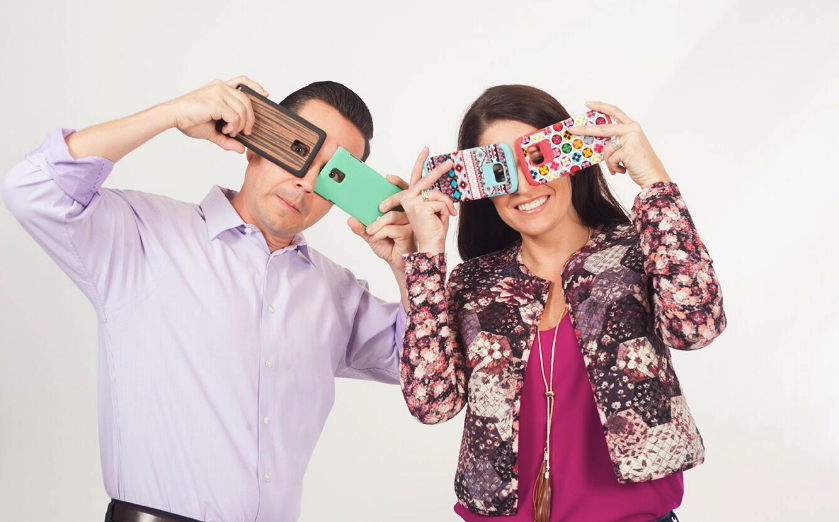
By YEC | Quarterly, Business Growth
Scaling an Empire With Will and Laura Land
For entrepreneurs Will and Laura Land, running an empire built on cell phone accessories (rightfully named Empire Case) wasn’t always in the cards. In fact, the idea originated as a means to pay the rent.
Just a little over a year out of college in 2001, Will was busy growing a business that resold Sprint PCS services to other businesses. This was a time when Sprint was brand new in the market, and in an effort to get the word out, the company gave Will free cell phone accessories to give to clients. Will began selling his leftovers on eBay for extra cash. It was then that he and his wife, Laura, who had been working in consulting and real estate at the time, realized that the decision to move into the cell phone accessories business was a no-brainer. “We were making more money doing this side thing on eBay. [We said,] let’s quit our jobs and go for it,” recalls Laura, Empire Case’s COO/CFO.
Growing Pains
It took Laura and Will a couple years of playing around with Empire Case’s model (the company was then called Accessory Export LLC) to discover what worked and what didn’t. By the time the couple got their sea legs in 2003, they knew they had to set a benchmark to designate their proof of concept: if they could reach $300 a day in sales, that would be their cue to go all-in, full time.
“We really had to change our mindset from, ‘This is a hobby, this is just something we’re doing in our spare time,’ to ‘Hey, we need to run this like a business,’” recalls Will, Empire Case’s CEO. “We achieved [our goal] so incredibly quickly that it spurred a transformation of our way of thinking. This wasn’t just a way to pay the bills. This could potentially be a future career.”
Launching a legitimate business wasn’t possible without hitting a few operational snags along the way: for the Lands, these included eBay policy violations trouble and getting their user IDs shut off for non-payment of fees. It took creating a third user ID to make them realize the path needed to move forward: “We had figured out how to not get ourselves into trouble anymore, and how to live by the rules. We had no issues with negative feedback or running out of stock, and we made sure we were shipping on time,” says Laura. “Once we hit those milestones, [we realized] we could do this as a business without fear that we’d mess up, and next week we’d be shut down.”
The Birth of an Empire

After building up the business for five years, Will and Laura realized that demand was outpacing what inventory they could manage to keep in stock, and that their original business model of buying locally from Los Angeles-area vendors and reselling that merchandise was no longer an option. It was time to start importing their product.
“We realized that we needed to start importing when our sales were outpacing the inventory we were able to purchase. For a long time we had a model where we would sell the products before we would even purchase the inventory, because we knew it was readily available and we could pick it up the following day,” says Laura. “It got to the point where that mentality no longer worked because we’d go to get the product and no one could fulfill the need of what we had sold.”
“Our demand was so incredibly strong that we could buy out all the suppliers -- and we dealt with about seven or eight suppliers -- and we’d clean them all out,” adds Will. “It still wasn’t enough.”
Two years after they began importing, Will and Laura ran into another issue: while the adoption of cell phone accessories was growing, the number of options and customizations on the market were extremely limited. The time had come for them to make their mark on an industry that wasn’t so niche anymore.
“For me, my frustration and why the Empire brand was born was that on the female side of cell phone accessories,” recalls Laura. “We were still selling the same patterns we had three years ago. [I thought,] I don’t want this pattern anymore and I don’t want a hot pink case for the ninth time. There was a better way to do this. Women want something more in this product than to choose between hot pink and hot purple, and we had the capability to create something better.”
That’s when the couple had the “a-ha” moment of creating a unique case that would simultaneously appeal to the audience and solidify their brand.
“For women, the [accessory] choices were pink, purple and zebra pattern in 2005 and 2006,” adds Will. “Someone in our warehouse came up with the idea that green was really hot [that year]. We said, let’s do a neon-green-and-zebra print. We brought it in and could not keep it in stock. Next thing you know, this green-and-black zebra was everywhere. That was a proof of concept -- seeing how everyone responded to a simple little change.”
On top of this victory, Will and Laura also introduced a paint splatter print, inspired by one of Laura’s bathing suits of a similar pattern. “Because we do our sales on marketplaces, it was great to differentiate from the competition because no one else was making this product. It’s not like we were competing with five or six people selling the same product. So we were able to get better profit margins and maintain them.”
“We still sell it today, six years later,” adds Will.

Scaling the Team
At the core of the Empire brand is Will and Laura’s hardworking team. At first, they kept it all in the family -- literally: Laura’s brothers were employees Nos. 1 and 2 in the business, and one still manages their warehouse today.
“That’s one of the hardest parts of scaling -- your team,” says Laura. “The team started from personal relationships through family, or you knew somebody, and that’s how we went for quite a few years. Everybody started from nothing. Will and I trained them from A to Z.” Given that the cell phone accessories industry was still relatively new at the time, the couple accepted the fact that the odds of finding someone with experience to hire was slim.
Despite retaining a handful of employees who have remained with the company for over 10 years, Will and Laura have frequently mulled the idea of bringing on senior-level people with outside experience -- an undertaking that they’ve found to be easier said than done.
“We really started to build the Empire brand and said, ‘OK, now we need to go out and hire people with marketing experience and people with wholesale sales experience,’ and I will say that that was one of the toughest processes that we have ever gone through,” says Laura, adding that she and Will have experienced a lot of turnover in the past three years alone.
The notion of remaining a family business while finding new team members who have the background needed to grow the company has been a point of contention for Will and Laura, who struggle to determine when to promote internally versus when to bring in someone new with a star-studded resume. Out of any five outside people they’ve hired, Will and Laura say they’ve usually had just one turn out great.
“I think that sometimes when businesses are starting up, one thing that they can really look is the value of those first employees who have really scaled with the company,” says Will. “They’re used to the scaling process and they generally know a lot more about the company than you can really hire for.”
“We’ve had to learn a lot of mistakes the hard way in hiring,” says Laura. “We learned that maybe Will and I know more than we think we know sometimes. The team evolves, the team changes, and now that we’re on year 13 of this, we’ve learned that there’s a lot of knowledge inside this company, and sometimes thinking that you’re gonna get [talent] from the outside isn’t necessarily the case. Sometimes it’s [about] stopping and taking a look at what’s already here and how we can develop that, change it and evolve it.”
4 Tips for Scaling an E-Commerce Business
Will and Laura Land offer their best practices for scaling an e-commerce business in a healthy and sustainable manner.
- Constantly reevaluate. “Just because you did something that way six months ago doesn’t mean that’s the way you have to do it today. Technology evolves, software evolves, and we have to constantly be reassessing what our process is and if it’s still efficient.”
- Associate a cost with every process. “[Laura] keeps a really good eye on that cost and fluctuations or any big changes that send out red flags,” says Will.
- Forecast. “Two years ago when we exploded [in business], I looked beyond what we were doing today and looked at what we’re going to be doing next month and two months from now,” says Will. “I wasn’t living in today’s sales; I was living in projectory lines.”
- Stay within a budget.“One thing that we do really well, and how we’re able to scale well, is in our line items.” says Will. “Every line item accounts for a certain percentage of our budget. So if sales are this amount, I know I have this percentage to spend on inventory. Sticking to those numbers is absolutely key: that way, when we grow, we have new budgets. When we shrink, our budgets readjust. And that’s what’s kept us scalable as far as company-wide processes, staff and inventory.”
The Separating (and Blending) of Work and Personal Lives
For Will and Laura, it’s taken time to figure out how to navigate the murky waters of building a business while also nurturing their relationship as husband and wife — a balance that’s still a work in progress. In order to divvy up ownership of the business, the couple first had to decide who would take charge of what.
“Early on, Will and I realized that having the same job was very detrimental because we were constantly stepping on each other’s toes, so that doesn’t really work in the scaling sense,” says Laura. “You really have to say, ‘These are your strengths, these are my strengths. We’ve gotta split up the division of labor and responsibilities.’” The two have successfully divided and conquered by playing to their strengths: Will focuses on the outward-facing duties (sales, purchasing, strategic planning, partnerships) while Laura manages more of the inward-facing operations (employee relations, finances, product design and processes).
But it takes more than just an understanding of who does what to successfully scale a company with your spouse. “There’s a big learning curve,” says Will. “At first it was exciting and fun, then you start to see some success and you have two different ways of thinking about it, and you butt heads. The biggest thing I love about this is I’m at work with my wife, but it’s not like we’re ‘married at work.’ We literally have a business relationship at work. A lot of outsiders come in and might see us as CEO and COO/CFO and not so much the husband and wife dynamic, but we go home and we’re completely different people.”
Laura chimes in: “It wasn’t always this way. That’s kind of where we’re at 13 years later. When we started this business it was in the bedroom of our house, so it was a much harder separation. I think over the years we saw personal issues evolve and would have to say ‘OK, this is a work issue,’ and now we’re very good at saying ‘As a business partner, I am angry with you!’ There’s been some therapy involved, I’m not gonna lie about that!” she jokes.
After working together for over a decade and gaining a firm grasp of what it means to run a business with your spouse, Will and Laura have taken it upon themselves to mentor married friends who are in their first few years of starting a company together. Their advice? Divide responsibilities, and don’t take business decisions personally.
“From the get-go, decide what’s your job and what’s his job, and respect that like you would respect a co-worker,” says Laura. “I think that’s the hardest thing as a married couple — you have to have that element of ‘I respect that this is the job you were given and I need to trust that you’re gonna get it done.’ Respecting those boundaries is really important.”
Working side-by-side all the time does have its perks: the couple enjoy dropping their daughter off at school together, and bring her into the office on days when she’s not in school. Will and Laura also make a concerted effort to eat lunch together every day.
Scaling Into 2016

When we spoke with Will and Laura, they were celebrating the launch day of their new website, which Will summarized as a “complete revamp, replatform, re-everything” that took six months in the making.
As far as growth is concerned, the two are looking to pivot the business away from a pure third-party marketplace play after primarily selling on platforms like Amazon and eBay. “As of today, we’re working with advisors and digital companies and are really trying to push down the path of our own e-commerce site that’s really generating revenue,” says Laura. “We’ve had an e-commerce site; it’s just never really been a revenue-generating site for us. The third prong to our approach is our wholesale and our B2B, and we’re aggressively trying to get in-store product placement for our brand.”
And with over 75 designs available on EmpireCase.com, it’s clear that the brand’s strategy of combining e-commerce, third-party marketplaces and wholesale/B2B is a viable strategy to continue scaling, while maintaining their core value of growing a business built on family and loyal team members. Perhaps most impressive of all is Will and Laura’s ability to divide and conquer while still keeping their personal relationship intact. Will summarizes their union beautifully: “It’s a perfect division of duties.”
This feature originally appeared in YEC Quarterly, a print magazine for YEC members.

